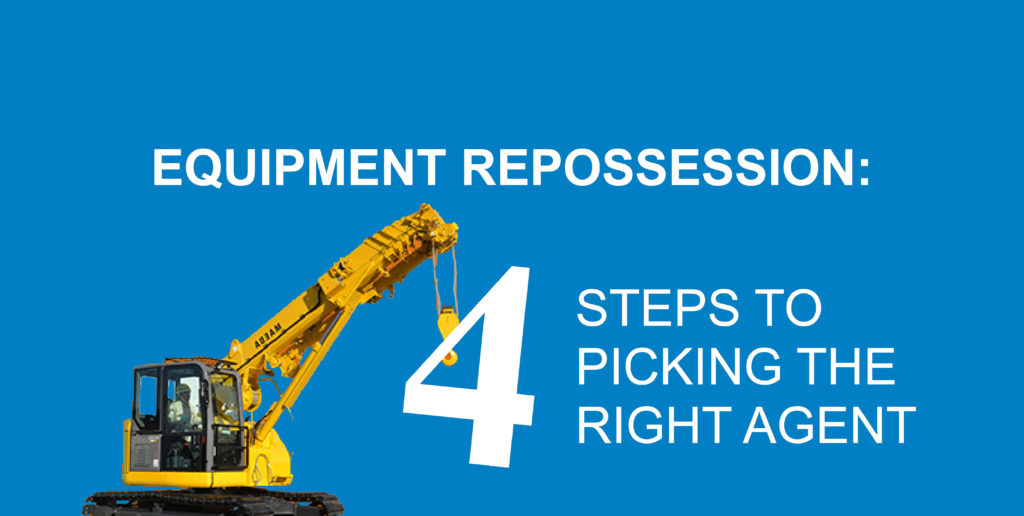
Equipment Repossession: 4 Steps to Picking the Right Agent
Initial Agent Vetting
Anytime you have to repossess collateral, the lender assumes meaningful risk. Courts have found repeatedly that lenders are responsible for the acts of their sub-contractors. This is why the initial agent vetting process is so important. As one of the top nationwide heavy equipment repossession management companies, we’ve vetted thousands of recovery agents and understand the process better than anyone. With industry requirements constantly changing for agents, here are the steps we recommend be undertaken before doing business with a repossession agency:
- Background checks on all principles
- Obtain copies of all required licenses/bonds
- Detailed insurance review (per clearly defined coverage requirements)
- Reference/client checks
- Employee training process
- Site visit – every storage location
- Physical security
- Data security
- Policies and procedures
Proper Contract and Documentation
It is essential that the relationship be codified via a comprehensive contract that contains the following requirements:
- Background check on ALL new employees (repeated every 3 years)
- Drug screening on all new employees
- No sub-contracting of repossession work
- Detailed specifications of insurance requirements
- Secure and proper record retention
- FULL indemnification
- Confidentiality
- Handling of personal property – particularly important given today’s regulatory environment
- Service standards
- Complaint handling procedures
- Fee schedule
Insurance Requirements
When it comes to heavy equipment repossession, proper insurance coverage is critical. Check out the below table of suggested coverages and amounts. From our experience in the industry, the coverages and amounts are more than sufficient in the case that a repossession goes wrong. Also, as a heavy equipment lender, you should always be listed as an additional insured.
The minimum insurance coverage required here under is as follows:
|
Coverage Name |
Description |
Min. Required Amount |
|
Workers Compensation
Employer’s Liability |
|
Statutory Each Accident – $100,000 Disease – $100,000 Policy Limit – $500,000 |
|
Automobile |
3rd party |
$1,000,000 |
|
Drive Away |
3rd party |
$1,000,000 |
|
Garage Keepers |
1st party direct |
$350,000 |
|
On Hook |
1st party |
$100,000 |
|
Employee Dishonesty |
1st party |
$500,000 |
|
General Liability |
3rd party |
$1,000,000 per occurrence $2,000,000 aggregate |
|
Other |
Any other |
|
Ongoing Agent Monitoring
As with many vendor relationships, proper measures have to be put in place for continued monitoring. Although a repossession occurs and your assignment is completed, you should still request the following from your agents:
- Annual site visit/inspection
- Attestation of compliance with contract provisions
- Sampling of records audit
- File audit
- Documentation
- Licenses
- Bonds
- Insurance review
Summary
We can all agree that recovering heavy equipment collateral is no small task but with the right partner by your side, it’s manageable. If you decide to use a direct agent strategy, the above information will help you make the right decisions in the process. Another option for equipment portfolio managers is utilizing a national repossession management company who handles the entire repossession process for you. For more information on our nationwide heavy equipment repossession services, contact Doug Melson at doug.melson@alsresolvion.com.
Download PDF Copy to Read
Get a PDF copy of our article to read later or share among your coworkers and colleagues. Should you have any questions, contact our team.
